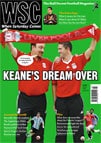 Ian Farrell grins and bears it as his team's wealth threatens to unbalance global football and alienate their own supporters
Ian Farrell grins and bears it as his team's wealth threatens to unbalance global football and alienate their own supporters
A day after the collapse of their audacious bid for Kaka, Manchester City spent a whopping £14 million on Mr Craig Bellamy, prompting Sky Sports into perhaps the least appropriate ever use of the phrase “soften the blow”. It seemed that after four months of rumour and bravado, the era of Sheikh Mansour Bin Zayed Al Nahyan and the Abu Dhabi United Group had well and truly begun.
But if your club’s image matters to you, how do you defend it trying to break the world transfer fee record by £60m? How do you defend offering to pay a potential new signing three times the current top wage in the world game, or buying an argument-waiting-to-happen for almost twice the amount West Ham paid for him 18 months, seven league goals and several injuries ago? The answer is, you don’t. You either go all “Chelsea”, start using the phrase “the daddy”, and advise people to deal with it. Or you keep your head down.
But I’ll admit I’ve tried, particularly when criticism seems motivated by xenophobia or is coated with reactionary bile. For instance, talented though Bellamy undoubtedly is, I would normally say that paying £14m for a 29-year-old who has yet to crack the one-in-two barrier for a Premier League season displays economic prudence on a par with throwing money down wishing wells. And yet I have found myself pointing out that the tabloids’ champion of “common sense”, Harry Redknapp, was prepared to pay a similarly inflated figure. I would also mention that City simply bid and haggled; they didn’t idly blow Spurs out of the water by telling West Ham to name their price.
I even calculated that a leap in the transfer record from the £46m paid for Zidane in 2001 to the £105m quoted for Kaká would only actually mean a 228 per cent rise in seven and a half years, compared to 353 per cent in the previous five (until Alan Shearer’s 1996 move to Newcastle, the highest was Gianluigi Lentini’s £13m switch to Milan). And it didn’t escape my notice that £500,000 a week is comparable with David Beckham’s $250m five-year salary/rights/sponsorship deal in LA. Beyond football, it is significantly less than Kimi Raikkonen’s £34m per annum.
I’ve further pointed out that West Ham’s less easily stereotyped owners have set new standards for profligacy, and that paying a globally famous match-winner half a million isn’t as insane as paying fair-to-middling right-back Lucas Neill £60,000 a week, frequently crocked underwear model Freddie Ljungberg £90,000 a week, or Nigel Quashie anything above minimum wage.
I’ve shot down the notion that this is a case of a playboy prince looking for a hobby. Mansour didn’t buy City as a plaything, just as he didn’t pay £91m for a stake in Ferrari because he likes cars. The latter was done to gain leverage with the FIA and hopefully bring a grand prix to Abu Dhabi. The profile of the emirate is a motivating factor behind much of what ADUG does with its sovereign wealth fund.
I’ve really tried to rationalise it all, but there is a limit. And that limit is called Nigel De Jong: a £16.7m signing who would have been available for £2.3m in the summer. OK, we’ve got far too much money. And the way we’re spending it isn’t going to do the game – or our soul – any favours.
As the club racks up the banner headlines and the bad press, I’ve found myself getting very nostalgic for a simpler time not that long ago. A time when it was owned by businessmen able to pick Colin Bell out of a line-up rather than a billionaire oil potentate or an ex-prime minister trying to stay one step ahead of Amnesty. When it was coached by a (relatively) honest (relatively) nice guy like Kevin Keegan or Stuart Pearce rather than Fergusonian blame-machine. Yes, we had Joey Barton to put up with, but I’m starting to look back on 2002-07 as a golden era: an age of mid-table comfort, honourable chairmen, coaches who were happy to admit that we’d played badly and deserved nothing, the odd derby win secured by players bought with clean money, and the start of a thriving youth policy.
Of course this thinking brings criticism from a certain type of go-getter. That it demonstrates a typically British contentment with mediocrity, a pathetic lack of ambition and a disdain for life’s winners. I’d prefer to say that it shows someone happy with a club as big as it had earned the right to be.
From WSC 265 March 2009